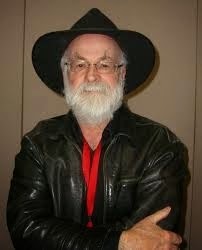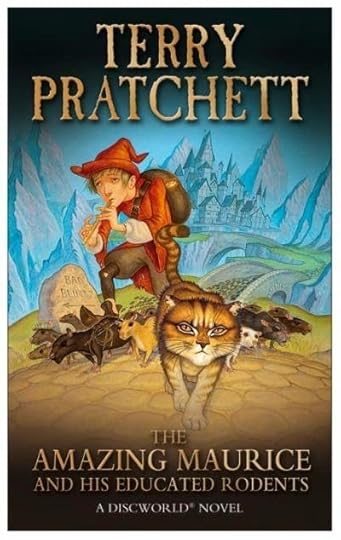Bad News, I'm afraid...
On Thursday March 12th, 2015, I was at my computer, trying to write, when my brother called and said, "Have you heard the bad news?"
"What?" I said. "What?"
He said, "I've just heard - I'm afraid that Terry Pratchett has died."
And that is bad news - for all lovers of Disc-World, for all lovers of writing.
No more Disc-world books. No more Commander Vimes. No more Lady Sybil. No more Granny Weatherwax or Nanny Ogg.
 Terry Pratchett It's not just Pratchett himself we have to mourn for - though we've lost an intelligent, compassionate, witty man of wide-ranging empathy and understanding, who raged against injustice and unfairness, and was able to make it a bed-rock of his writing.
Terry Pratchett It's not just Pratchett himself we have to mourn for - though we've lost an intelligent, compassionate, witty man of wide-ranging empathy and understanding, who raged against injustice and unfairness, and was able to make it a bed-rock of his writing.
No, with Pratchett, a whole world dies - the Disc-World. From the crowded, edgy city of Ankh-Morpork, with its benevolent tyrant, its seething streets and its Unseen University of wizards, to the mountains of Lancre with its witches and pragmatic villagers, to forested Uberwald with its vampiric Countess, to the Counterweight Continent and the ancient land of Djelibaby.
Pratchett's inventiveness couldn't be contained in one city, even one as populous and multicultural as Ankh-Morpork - he needed a whole world. And unlike most other fantasy worlds, Pratchett's was ordinary, in the best possible sense. Even his wizards, witches, werewolves, zombies, dwarfs, goblins, trolls and golems had ordinary lives to live.
His was not a fantasy populated by warriors and mages - there were also blacksmiths, daughters-in-law, shop-keepers, policemen, psychos, farmers, journalists, con-men, fishermen, thieves... All human life was encapsulated, understood, sympathised with, made fun of.
We have lost the Thieves' Guild and the Assassin's Guild, Captain Carrot and the ingenious but always discrete tribe of Igors.
All these places and institutions, all these characters, showed us our own world through a slightly distorting mirror. He didn't write fantasy. He wrote reality with a twist.
The series may well be continued by another writer, but the books can never be the same now the Arch-Wizard himself has gone...
I shall be doing a lot of re-reading, I think...
Of course, Master Pratchett had early-onset Alzheimer's, and had said that he wanted this country's laws to be changed, to allow people with terminal or incurable illnesses to choose when they died. Perhaps, instead of selfishly wishing for more books, we should try to be glad that he died, according to the Guardian, “with his cat sleeping on his bed [he was a famous cat-lover] surrounded by his family,” and that his decline into Alzheimer's is over.
How I feel for his family. If I feel this sad, when I never met the man except through his writing, how much worse, how much much worse, it must be for them.

For those who don't understand what Pratchett meant to his fans, here's a link to some of his quotes.
And here's a link to an article in which Pratchett's friend, Neil Gaiman, contests the view that Pratchett was 'a merry elf.' He wasn't, Gaiman says, he was angry.
This comes as no surprise to me. No one could encounter Sam Vimes and Granny Weatherwax - or Vetinari - or Death - and not realise the great fire of angry that was burning underneath them. A great deal of comedy is stoked by anger. See Mel Brooks' The Producers, for example. Much laughter is ridicule, and ridicule is an attack. Brooks himself said that one of the best weapons against thugs like the Nazis is laughter, which cuts them down to size.
As one of the commentators, 'eastofthesun' says, below the line of Gaiman's article,
Goodbye, Terry Pratchett, and thank you so much.
"What?" I said. "What?"
He said, "I've just heard - I'm afraid that Terry Pratchett has died."
And that is bad news - for all lovers of Disc-World, for all lovers of writing.
No more Disc-world books. No more Commander Vimes. No more Lady Sybil. No more Granny Weatherwax or Nanny Ogg.
 Terry Pratchett It's not just Pratchett himself we have to mourn for - though we've lost an intelligent, compassionate, witty man of wide-ranging empathy and understanding, who raged against injustice and unfairness, and was able to make it a bed-rock of his writing.
Terry Pratchett It's not just Pratchett himself we have to mourn for - though we've lost an intelligent, compassionate, witty man of wide-ranging empathy and understanding, who raged against injustice and unfairness, and was able to make it a bed-rock of his writing.No, with Pratchett, a whole world dies - the Disc-World. From the crowded, edgy city of Ankh-Morpork, with its benevolent tyrant, its seething streets and its Unseen University of wizards, to the mountains of Lancre with its witches and pragmatic villagers, to forested Uberwald with its vampiric Countess, to the Counterweight Continent and the ancient land of Djelibaby.
Pratchett's inventiveness couldn't be contained in one city, even one as populous and multicultural as Ankh-Morpork - he needed a whole world. And unlike most other fantasy worlds, Pratchett's was ordinary, in the best possible sense. Even his wizards, witches, werewolves, zombies, dwarfs, goblins, trolls and golems had ordinary lives to live.
His was not a fantasy populated by warriors and mages - there were also blacksmiths, daughters-in-law, shop-keepers, policemen, psychos, farmers, journalists, con-men, fishermen, thieves... All human life was encapsulated, understood, sympathised with, made fun of.
We have lost the Thieves' Guild and the Assassin's Guild, Captain Carrot and the ingenious but always discrete tribe of Igors.
All these places and institutions, all these characters, showed us our own world through a slightly distorting mirror. He didn't write fantasy. He wrote reality with a twist.
The series may well be continued by another writer, but the books can never be the same now the Arch-Wizard himself has gone...
I shall be doing a lot of re-reading, I think...
Of course, Master Pratchett had early-onset Alzheimer's, and had said that he wanted this country's laws to be changed, to allow people with terminal or incurable illnesses to choose when they died. Perhaps, instead of selfishly wishing for more books, we should try to be glad that he died, according to the Guardian, “with his cat sleeping on his bed [he was a famous cat-lover] surrounded by his family,” and that his decline into Alzheimer's is over.
How I feel for his family. If I feel this sad, when I never met the man except through his writing, how much worse, how much much worse, it must be for them.

For those who don't understand what Pratchett meant to his fans, here's a link to some of his quotes.
And here's a link to an article in which Pratchett's friend, Neil Gaiman, contests the view that Pratchett was 'a merry elf.' He wasn't, Gaiman says, he was angry.
This comes as no surprise to me. No one could encounter Sam Vimes and Granny Weatherwax - or Vetinari - or Death - and not realise the great fire of angry that was burning underneath them. A great deal of comedy is stoked by anger. See Mel Brooks' The Producers, for example. Much laughter is ridicule, and ridicule is an attack. Brooks himself said that one of the best weapons against thugs like the Nazis is laughter, which cuts them down to size.
As one of the commentators, 'eastofthesun' says, below the line of Gaiman's article,
"The strength of TP's writing, to me, comes from the tension between his huge compassion and deep cynicism - two seeming opposite traits. And yes, that voice has become stronger over the years... but it's there in all his strongest characters, Vimes and Granny Weatherwax above all but also Death, Susan Sto Helit, Vetinari, Tiffany Aching...All these characters are so different, but that tension runs deep in all of them. The humour is what everyone talks about first, but the passion is what gives it power."I've no idea who 'eastofthesun' is, but I agree entirely. Couldn't have put it better.
Goodbye, Terry Pratchett, and thank you so much.
Published on March 13, 2015 17:00
No comments have been added yet.
Susan Price's Nennius Blog
"I have made a little heap of all I've found..."
"I have made a little heap of all I've found..."
...more
- Susan Price's profile
- 71 followers



